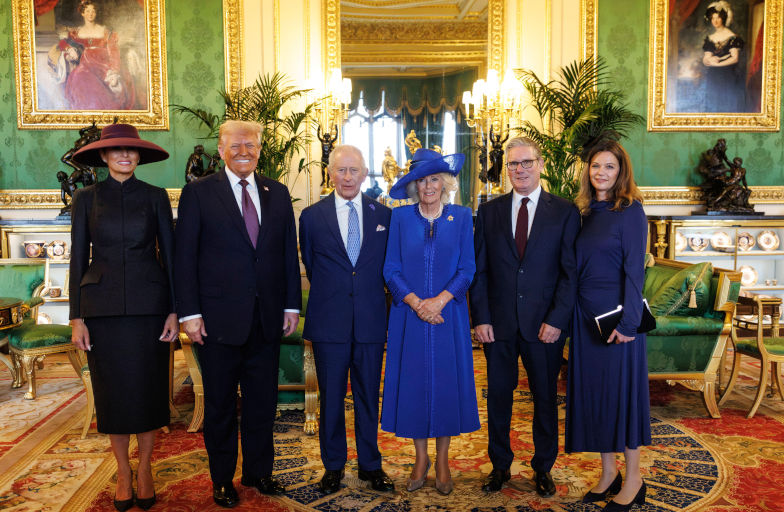Royal banquets, political scripts and the Gaza tragedy
September 23, 2025
When King Charles III hosted President Donald Trump at a state dinner, the evening was, at least formally, meant to celebrate the bond between two allies.
Yet no royal banquet is entirely free of politics. British Prime Minister Keir Starmer had recently declared that the United Kingdom is committed to recognising a Palestinian state – an announcement that framed the backdrop to the visit.
The issue of Gaza itself did not surface in the speeches at the banquet. It was raised elsewhere, during a press exchange. When Trump was asked about recognising Palestine, he dodged the question by invoking 7 October as the most horrible thing that ever happened. The formula is calculated – by framing the Hamas-led attack as a singular rupture in history, it displaces any discussion of the far greater scale of destruction unleashed on Gaza since. This rhetorical tactic has been employed repeatedly by Israel’s advocates to justify the devastation of entire neighbourhoods, the mass displacement of civilians and the staggering death toll that international organisations increasingly describe as genocidal.
Even Starmer, while making a historic nod towards Palestinian statehood, felt compelled to echo the refrain: Hamas should not have a future in Palestine. The message was clear: recognition of Palestine, but only on terms dictated by Israel’s strategic preferences.
The 7 October narrative and Israel’s strategy
History shows that Israel has, for decades, nurtured and exploited Palestinian divisions. In the 1980s, Israeli authorities tolerated and indirectly encouraged the rise of Hamas as a counterweight to the secular PLO and Fatah. Scholars, journalists, and even former Israeli officials have admitted this policy: divide the Palestinian political sphere, weaken the Palestinian Authority and prevent the emergence of a unified negotiating partner.
The idea that Israel may have allowed — or even manipulated — 7 October to happen is no longer dismissed as outlandish conspiracy. Reports have surfaced that Israeli intelligence had significant forewarning, but failed to act. For a state renowned for one of the most advanced surveillance networks, the scale of the Hamas attack raises troubling questions. Was it incompetence – or calculation? By permitting an assault that killed Israeli civilians, the government secured a pretext for unleashing total war on Gaza, destroying infrastructure and lives on a scale unseen in the region for decades.
Meanwhile, hostages — Israeli and foreign alike — have become bargaining chips, their fate seemingly secondary to Israel’s broader aims. The pattern recalls earlier episodes in Israeli history where military objectives trumped civilian safety, even of its own citizens.
US’ complicity
The US remains central to this tragedy. Despite global protests, UN Security Council resolutions, and the mounting evidence of war crimes, Washington has consistently shielded Israel diplomatically and armed it materially. How else can one explain the contradiction between professed American values of democracy and human rights and its unflinching support for collective punishment in Gaza?
The American posture is not simply one of alliance – it often appears as subservience. Israel’s influence in Washington, through lobbying networks and strategic entanglement, has produced a dynamic where US foreign policy seems to echo Israeli priorities almost reflexively.
Theatre at the Palace
Against this backdrop, the London state dinner resembled a carefully staged performance. Trump’s banquet speech — halting, repetitive, and delivered with the awkward cadence of a schoolboy reciting a memorised composition — laid bare the thinness of his rhetoric. He spoke as if by rote, offering little more than praise for the two countries as the supreme powers of the English-speaking world. No mention of Gaza, of course.
The King, by contrast, projected dignity. Yet his silence on Gaza underscored the constitutional and political restraints of monarchy. He could speak plainly on Ukraine — “Today, as tyranny once again threatens Europe, we and our allies stand together in support of Ukraine, to deter aggression and secure peace” — but offered no word of peace or security for Gaza and the Palestinian people.
The royal pageantry thus stood in stark relief to the reality outside: a besieged population facing devastation, while Western leaders gestured at peace, yet upheld conditions that perpetuate war.
The larger lesson
The meeting crystallised the contradictions of Western policy towards Palestine. Leaders speak of peace while repeating the tropes that justify war. They invoke international law, but sidestep it when it applies to Israel. They express sympathy for Palestinians while demanding that the one political force still resisting Israeli domination must vanish before a Palestinian state can be born.
In this light, the question is not whether Britain or America will eventually recognise Palestine. The real question is whether such recognition, when it comes, will be genuine — rooted in justice and equality — or hollow, contingent on Palestinians accepting diminished sovereignty under Israeli control.
The royal dinner will be remembered not for its menu or its splendour, but for what it revealed: how ritualised Western politics has become when it comes to Palestine, how reflexively 7 October is weaponised to obscure ongoing crimes, and how, even in the grandeur of a royal hall, truth can be silenced by diplomacy.
The views expressed in this article may or may not reflect those of Pearls and Irritations.

